Welcome to the week. We’ve got a lot to cover; but first let’s look back at the best stories we came across in the past seven days…
Cars vs bikes, literally: Chinese ride-hailing giant Didi is meddling in the business of dockless bike-share companies in what looks like an effort to tame their growth.
Better boardwalks: We love this brilliant, modular sidewalk expansion method from London. Where could we put wider sidewalks to use in Portland?
Funding boost: Jump Bikes (formerly Social Bicycles), the bike share company that provides bikes and tech for Portland’s Biketown bikes, received an influx of venture funding after winning an exclusive permit for dockless e-bikes in San Francisco.
Effective bike marketing: If you want your city to make real progress in getting more people on bikes, you need to internalize and implement these eight rules from Modacity.
Hey that’s cool: A paper on robot-controlled bicycles from researchers at Caltech (PDF) included this cool graphic (below) that shows the tire marks of 800 bicycles being pushed until they fall over (aka ghostriding).

(Image: Caltech)
Riding indoors without shame: “Traffic” author Tom Vanderbilt has come to not just tolerate riding inside. Because of Zwift and “smart” trainers, he actually loves it.
TriMet’s dirty buses: Did you know our regional transit provider is behind-the-times when it comes to using electric buses? Climate Solutions says 60 percent of TriMet’s trips are still taken on diesel buses and they want the agency to make a full transition to electric.
“Petextrian” is the new “jaywalker”: Both terms blame the victim and are pushed by the same forces that want to maintain a status quo that offers unfettered access for the most dangerous and harmful urban road users — people who drive. This must-read from The Baffler lays it all out.
Advertisement
Race-based complaints: “Black Urbanist” writer Kristin Jeffers calls out dockless bike share critiques that she feels are rooted in bigotry.
Wrong side, ACLU: The Americal Civil Liberties Union has inexplicably joined a lawsuit that bans the use of photo radar cameras to catch speeders. That’s dangerous and it shows the org’s “windsheild bias” says Streetsblog.
Wrong side, Sierra Club: Another example of a “progressive” org that doesn’t understand transportation and livable cities is the Sierra Club: They oppose a California bill that would encourage transit-oriented development.
Cities for kids: Financial Times breaks down what makes a kid-friendly city. No surprise that it’s all about density, proximity to parks and streets built for people, not cars.
Freeways and poor neighborhoods: This story about a poor area of Orlando that’s encircled by toxic freeways is heartbreaking — and a great example of who the City of Portland should not support any expansion of I-5 through the central city.
More inspiration: London’s walking and cycling commissioner says their protected bike lanes move five times as many people per hour than regular lanes. Best part of the article is the lead photo that looks a lot like Naito Parkway and Waterfront Park (hint hint PBOT!).
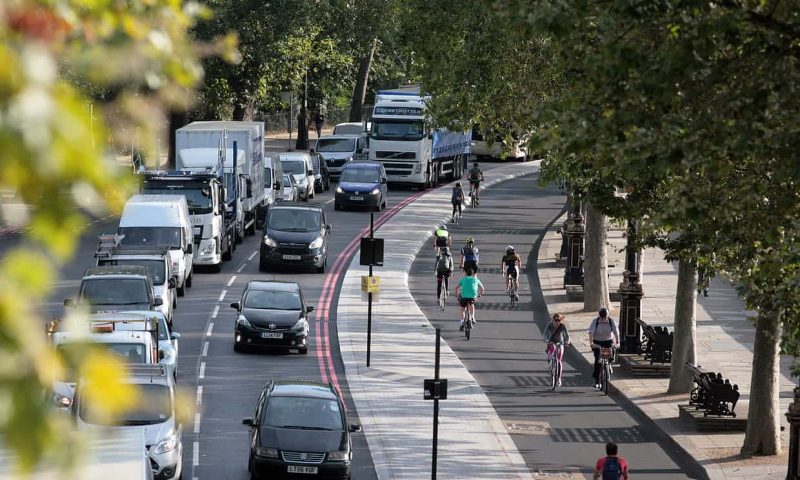
could should look like this. (Photo via The Guardian)
199-year old bicycle: A collector uncovered an extremely rare and completely fascinating “hobby horse” bicycle which was first patented in 1818.
Existing traffic is a tax on the poor: Here’s a solid argument in reply to concern trolls who say congestion pricing is regressive and unfairly targets the poor.
— Jonathan Maus: (503) 706-8804, @jonathan_maus on Twitter and jonathan@bikeportland.org
Never miss a story. Sign-up for the daily BP Headlines email.
BikePortland needs your support.

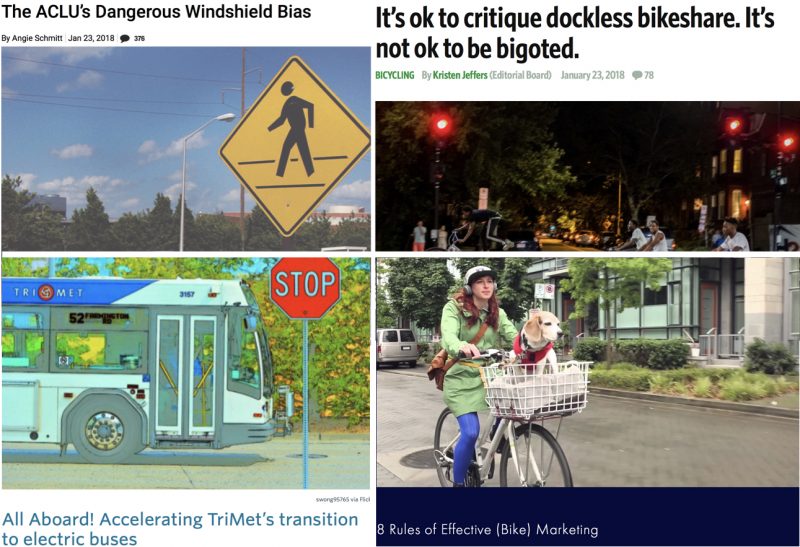
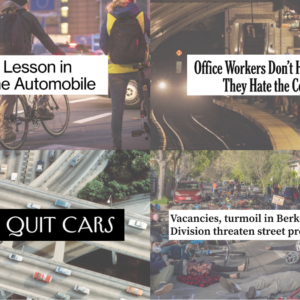
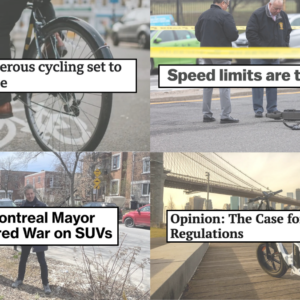

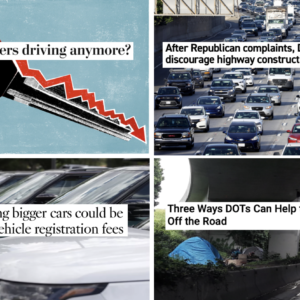
Thanks for reading.
BikePortland has served this community with independent community journalism since 2005. We rely on subscriptions from readers like you to survive. Your financial support is vital in keeping this valuable resource alive and well.
Please subscribe today to strengthen and expand our work.
I love this part from the Baffler article, “pedestrians could bully self-driving cars into gridlock.” “Put another way: Pedestrians, long shunted to the margins of America’s transportation system and left to fend for themselves, would now be empowered to walk when and where they please, reclaiming their equal right to move about the city.”
I think this is a likely and desirable outcome of self driving cars, so perhaps they are a good thing.
It is an obvious outcome.
Obvious outcomes from exploiting this inherent aspect of self driving technologies include anti ped/cycling sentiment going totally off the rails with legal system to follow, people disabling/overriding technology that helps protect vulnerable road users, and more deliberate violence against peds and cyclists.
Trying to force outcomes in society from a position of weakness is not a viable strategy.
It will be interesting to see if Asimovs concept of the three laws of robotics will hold up when self driving cars come to pass.
“A robot may not injure a human being or, through inaction, allow a human being to come to harm. A robot must obey orders given it by human beings except where such orders would conflict with the First Law. A robot must protect its own existence as long as such protection does not conflict with the First or Second Law.”
The way you describe the motoring public as angry, violent and vengeful when faced with pedestrians reclaiming the ability to safely walk the earth makes me think such a group should not be given the responsibility of operating 4000 lb chunks of speeding metal.
Do people using the road on foot, have any responsibility to look out for their own safety in doing so? Are they, because they’re on foot and not driving, entitled to be completely oblivious to the use of or approach of motor vehicles towards them on the road? I believe most people would think not.
Many streets have many motor vehicles in use on them. While this being the case, requires of the person on foot that they use more care in watching for traffic than they’d likely have to on streets where use of motor vehicles is light, strong indications are that far more than a simple majority of the public, favors streets supporting the use of large numbers of motor vehicles on a regular daily basis.
Thank you for acknowledging that streets with heavier automobile traffic are more dangerous for those not in cars than streets with lighter or no automobile traffic.
Odd. Here in Greensboro, when our streets are heavily congested at peak periods, car traffic tends to move much more slowly and we have far fewer pedestrian injuries and deaths. However, when those same streets are much less congested, such as mid-day or at night, traffic often moves well above the speed limits and we have more deaths and life-changing injuries among pedestrians crossing the street, as cars cannot stop in time, not at 30-55 mph.
How is Portland different?
“Do people using the road on foot, have any responsibility to look out for their own safety in doing so? Are they, because they’re on foot and not driving, entitled to be completely oblivious to the use of or approach of motor vehicles towards them on the road?”
Entitled? Completely oblivious?
The framing of these questions suggests you don’t understand the points being made here regarding the rights of humans on foot.
Could not open the FT article on kid friendly cities and density. What makes a kid friendly environment is low density with large yards for the kids to play in. High density is not friendly to kids or anyone else (except maybe for rats).
On congestion pricing, it will force many low-income single parents out of their homes because they will no longer have a relatively inexpensive way to get to their job.
kid friendly cities: I had to open it 4 times before it loaded the actual article, and that was via a Google link, so maybe that helped…
looks like Berlin, Amsterdam, and Copenhagen are good… Paris, London, and New York not so much…
I’m for speed cameras, as I think the benefit outweighs the intrusion, but I’m still glad we have organizations like the ACLU that put up a fight against systems that automate law enforcement.
So I wouldn’t necessarily say they are on the “wrong side”. That is almost like calling a defense lawyer unethical for representing someone that is clearly guilty! They have some decent points (and some weak ones too).
I would be more on board with automated enforcement if we had strict laws against retention of identifying information of those not violating the laws. If speed cameras are used to monitor people driving legally, they may be a net win for traffic safety, but a net loss for democracy. It is clear where the greater good lies.
the analogy is flawed. The camera is the means by which we sort the guilty from the blameless. The camera is, so conceived, the judge not the lawyer.
I think an answer to the privacy concerns of Traffic Cams as brought up in the article about ACLU lawsuits, is for cities to come up with another catagory of moving violation that is enforced against the vehicle and its owner and not the driver like a parking ticket. This would eliminate the need to photograph the driving, and instead the camera could just point at the license plate zone, or in the future low range RFID tags could be attached to license plates eliminating the need for cameras. These “car based” moving violations would be for things like violating 20 mph speed limits etc. And would not go against a drivers record but just need to be paid like a parking ticket. Cops could still enforce the entire suite of moving violations as they do now.
This is an interesting concept!
I could see all sorts of thorny issues from attributing anything to an inanimate object. “Sure, you can fine my car/gun/toxic industrial runoff, can’t believe it hurt all those people, as long as my personal record stays clean…”
it’s called a corporation…
The way camera enforcement works in Australia (where I’ve experienced it) is that the citation is sent to the registered owner of the vehicle, who then has the opportunity to pay the fine and lose points from his/her license, or identify the driver – whereupon the enforcement agency will send that driver a citation. The recipient of the citation always has the option to go to court. If the registered owner of the vehicle is a corporation, the corporation has the option to pay a fine that is triple, or identify the driver.
When I worked for the Australian government, I got speeding ticket based on a photograph from a speed camera. The car I was driving was registered to the government, and they sent the ticket to me – I then sent the fine payment to the state government (I didn’t lose any points because I had a Australian Capital Territory license at that time and they didn’t have points then).
I would love to have more speed and red light cameras around.
That’s how it works in Oregon, too, unless they’ve changed it. Admittedly the last time I got a photo radar ticket was in the previous century, but I received a notice in the mail about a week later. It included a photo (in this case a front photo that showed the driver, not necessarily clearly identifiable). You could return a form certifying that you were not the driver (but at that time didn’t need to say who WAS the driver). At the time dismissal was automatic if you checked that box, but now I believe you have to specify who was driving the car. I know this because shortly afterwards my wife got caught, but it came to me as the registered owner and I (truthfully) checked the box saying I wasn’t the driver.
The streetsblog story doesn’t mention invasion of privacy as being among the reasons the ACLU objects to the Iowa bill. Maybe one of the linked stories in the article does.
Speed violation cameras taking people’s pictures exclusively for the purpose of issuing citations to the driver of a vehicle exceeding a speed limit, isn’t a violation of privacy, any more than is an actual police officer stopping somebody exceeding a speed limit, and issuing them a citation in person. All anybody that doesn’t want their picture taken by one of these cameras has to do, is stay near to or below the posted speed limit.
I think speed violation cameras and red light cameras are a definite aid to taming some of the bad driving that people on foot have to be overly wary of just to safely cross the street. Watching for approaching traffic to be sure it’s slowing and stopping, before stepping onto the street is reasonable and expected. So is continuing the same watchfulness mid-crossing.
Not reasonable, is having to completely stop walking, mid-crossing, to wait for someone driving that decides they’re not going to stop, figuring there’s a strong chance they can go ahead and run a red light and not receive a citation.
What, you mean like they do in many, many other countries around the globe? Naw, now that would violate personal rights, and the ACLU would get really fired up.
all existing moving violation should already be treated that way… if your vehicle is seen being driven illegally then you are responsible… unless you have somebody else saying they were the ones driving and the picture is close enough… don’t want rich people paying off others to take the fall… you’d need to prove in court your car was stolen if you wanted to use that excuse…
we shouldn’t have to rely on being able to see clearly through window tint and then only be able to issue a citizen citation if it’s an owner of the vehicle… if we have video of the plate and vehicle then the owner should get the citation…
THe burden of proof should be on the state, not on the vehicle owner.
If we were talking about activities such as sewing or reading or teaching or eating I would agree with you, but piloting an automobile is almost universally considered something that requires certification by the state, & periodic testing for competence (however inadequate this may be in some jurisdictions), and as such I think when an infraction is recorded, the burden of proof could be argued to shift toward the owner of the vehicle. Can you tell us why you don’t think that makes sense?
Traffic enforcement is a lesser goal than preservation of our democratic norms.
I don’t know to what degree I can be compelled to assist the police in more serious cases, but I would assert that the bar should not be higher in the case of a traffic violation than it would be, say, in the case of a theft. If I am obligated to provide similar assistance in a more serious crime, then I can see a clearer argument that I should also be so required in this case.
By the way, my drivers license is required to operate a vehicle, not to own one, so your licensing argument doesn’t quite follow.
Who should be penalized for a vehicle that is used in multiple moving violations? Unless the car was stolen in each case, I would assume it’s the vehicle owner’s responsibility.
Exactly.
The driver?
Well of course, but that is only relevant/interesting in situations when the driver-at-the-moment-of-infraction is not the owner, and in that situation the way the authorities are going to have to find the driver is via the registered vehicle owner, no? I’d think you’d be in favor of that as the alternative would surely be vastly more intrusive in the realm of civil liberties.
The only way I could see being able to support compelling the vehicle owner to assist the investigation would be if that power already exists (which it might; I’ve never been in a position to find out). I would not be in favor of giving the police new powers to threaten or compel assistance with an investigation without a very good reason.
As much as I support increased traffic enforcement (which I totally do), I also support (even more strongly) preservation of civil liberties. Even if this means that, in some cases, a traffic citation cannot be issued.
Besides, if I say my friend was driving, and they say they weren’t, who gets the ticket?
Did you report the vehicle stolen?
As I mentioned in an earlier post, tolls are sent to the owner of the vehicle, not the driver of the vehicle. I had a car racking up tolls in Washington a year after I sold it. I had to send in evidence prove that I had sold the vehicle to get out of paying the tolls.
Michigan has a law that makes the owner of the vehicle liable for injuries caused by negligent operation, as long as it was driven with the owner’s express or implied consent or knowledge. California has a similar law:
“Every owner of a motor vehicle is liable and responsible for death or injury to person or property resulting from a negligent or wrongful act or omission in the operation of the motor vehicle, in the business of the owner or otherwise, by any person using or operating the same with the permission, express or implied, of the owner.”
I don’t live in a democracy here in the US and I never want to… that would be horrible…
Maybe we just differ on this point: I think people should have a big voice in how their communities are planned and built. In this case, I think the people of E Portland know what they need better than people who don’t live there do.
your car comes out of gear and rolls into your neighbor’s house crashing through their wall…
is the driver responsible? no, the responsibility is on the owner of the vehicle because they allowed their car to crash through that house… if you allow somebody to drive your vehicle you should be assuming responsibility for what that person does with your vehicle… they could crash into something and then run away and you’re still on the hook… it always comes down to the owner… you’ll be in a big mess loaning things like vehicles and weapons… but you should be in an even bigger mess… these are things that cause massive destruction and have little controls…
I am hugely in favor of speed and red light cameras–we have almost 100 years of proof that motor vehicle operators–call them motoring primates, maybe–should not and can not be treated as fully human. Want your human/civil/legal rights? Don’t drive. Isn’t 30K deaths a year enough to start rethinking this stuff?
On the “congestion pricing is not regressive” point, note also that modern congestion pricing is done with electronic toll technology, so it is feasible to provide discounts to the lowest-income drivers.
Wow – the sierra club being on the wrong side of a cycling issue?! I’m in shock.
It’s stuff like this that made me stop supporting the Sierra Club around the beginning of this century.
Personally, I’d like to know more about why they oppose the bill, either from them directly, or from a neutral source.
The article has a link to their letter. Homework.
Thanks — I read the article but missed the link.
That London sidewalk article: though the extensions are certainly colorful, it seems that (in the photo anyway) the sidewalk already there was wide enough. Also, Portland sidewalks are 2 squares wide! I was amazed by this when I first moved here. Maybe not everywhere but most places I’ve walked. The only impediment is overgrown shrubbery.
I saw the article and thought “Better Blocks Project”
you can report overgrown shrubbery on the City of Portland web site: https://www.portlandoregon.gov/27447
Click where it says:
* Environmental Violation: Bushes/trees/vegetation encroaching into right-of-way.
I take a picture of the violation on my way by and rename the photo to the street address of the incident… that way I remember where it was…
I did this for 10 blocks on both sides of my street, reporting about a dozen violations of encroaching sidewalk vegetation… about a month later all but 2 people had cut their plants back…
RE: TriMet bus electrification, I think an important question you have to ask is whether you would rather spend money on expanding service or new electric bus purchases.
They cost about 2x as much and up until recently TriMet’s fleet was well above avg age (18 years old). Now they are almost all 8-years or less. They are testing 4 new all-electric buses in a couple years. The hybrids they bought in the past yielded no cost savings and cost a fortune to maintain. They also got very poor mpg.
And of course Seattle is going electric, they already have a ton of infrastructure.
I am not saying we can’t expect better but we have areas of East Portland emerging with very poor transit coverage and high demand right now, while all the hipsters and millennials move to inner neighborhoods and don’t care about surge pricing or paying drivers less than minimum wage. That, to me, is a more prescient issue.
Another important question to ask is whether electric buses have lower lifetime greenhouse gas emissions than diesel. If the electricity is not coal generated, the answer is probably yes.
In the age of cheap natural gas, legacy coal plants that operate at <40% efficiency are rapidly being decommissioned in favor of combined-cycle plants with 60+% efficiency. Generators are losing money using coal these days.
I don’t think we should ask people to trade their health (in the form of breathing more polluted air) in exchange for better transit service.
The electric buses by BYD are turning out to be lemons. They’re not ready for prime time yet. https://www.abqjournal.com/1122198/art-is-a-victim-of-the-new-bus-blues.html
While trying out an electric bus concept, Tri-Met could maybe try some more more innovative designs, allowing for more narrow footprints in congested areas. This would hopefully allow for less congestion by better enabling human-scale mobility devices (bikes, scooters, feet) to maximize use the public thruway. Well, it was a nice thought.
I’d like it if they weren’t always driving on the bike lane striping and wearing it away…
Good idea–there are Portland neighborhoods that can make a Subaru Impreza feel like a tractor-trailer–why not have more small buses running more often?
Here:
https://www.google.com/maps/@45.5128869,-122.6229888,3a,60y,204.93h,66.65t/data=!3m6!1e1!3m4!1swNfNsPb4cejbHtVvYP6OiQ!2e0!7i13312!8i6656
At least they put in an ADA ramp!
You didn’t know that sidewalks breed telephone poles? Here in Greensboro everyone knows that.
We do this on the west side too. Here’s a fairly new sidewalk, which, according to the plans, is 5 feet wide: https://goo.gl/maps/iFm9upcLFWm
A couple of years ago (4 years) I was in San Antonio and there were a large number of both fueled and electric Jitneys. Fare was only a quarter. some were on rails and some were wheeled (tired) All had rollupable windows, but they were usually down. No air conditioning but the shade was good. I thought then that Portland should have something like that, although it would be an administrative night mare. BTW they were making money in spite of the large workforce. Or maybe because of it. Their administrative overhead was about half the size of Trimets’.
I’d love to have the old streetcar grid back…
Not red-light cameras, but on the topic of video surveillance: Seattle just removed a bunch of cameras that were installed five years ago under the guise of “port security” – but instead of pointing the cameras at the port, port facilities or the bay, they were pointed the opposite direction at nearby residences instead. The cameras were never officially activated and the whole thing cost $5 million.
http://westseattleblog.com/2018/01/coming-down-never-used-seattle-police-surveillance-cameras-wireless-mesh-network-being-removed-starting-today-in-west-seattle/
big deal, they scrapped a camera security plan… they’ve wasted $5 million on worse things…
The Fortune article about congestion pricing in NYC not being regressive reminds me of an all too common misunderstanding that appears here in the comments. Most people focus on the cost, the fee, rather than on what the fees are then used to accomplish. By always and reflexively shooting the messenger we never get a chance to find out all the salutary things that can flow from this kind of re-levelling of the playing field, this reallocation, this Ecological Tax Reform (there are many names for this).
I guess you missed the story that the electric buses currently being produced are lemons:
http://krqe.com/2018/01/26/company-responsible-for-art-bus-problems-was-not-citys-first-choice/
Probably smart to wait until things are worked out before wasting millions of dollars.
I don’t know why they thought Chinese buses would be a good idea… I know that China makes more cars than any other country, but you don’t see them here in the US for a reason…
I would be more concerned about Didi trying to take over Chinese bikesharing companies like Ofo if it were happening here and if dockless in the USA were limited to Chinese companies. Ofo certainly is a big player here, but of the three major players I observed in Seattle a couple weekends ago, only one is Chinese and subject to Didi’s monopolistic behavior. The other two – Lime and Spin – are US based, and frankly I found their bikes a lot more reliable than Ofo’s anyway. If this kind of behavior were happening in the USA I’d be up in arms though.
In reality, there is zero reason to every photo the driver. The car commits the act. Period. Send the bill to the owner. If they don’t pay, get a judgement. Just like a parking ticket. Do they ever need a face for a parking ticket?
Oregon laws doesn’t allow you to ticket a vehicle for a traffic infraction. Only a driver can be ticketed.
We know. Dumb laws.
that needs to change… the owner of the vehicle needs to be held accountable for their vehicle or be willing to ID the person that did it if it wasn’t them… and that person has to admit it, or the owner is still held responsible…
if a citizen is writing the parking ticket then yes, they need a face because they’re writing a ticket for violating ORS… there’s no law allowing a citizen to write a ticket for city code parking violations, only state level ones…
I agree that the owner should be held responsible, unless they get somebody else to fess up to being the driver… and even that needs a check and balance system to ensure the rich aren’t paying people off to take the fall…